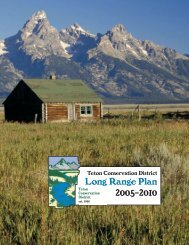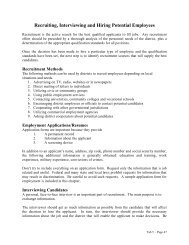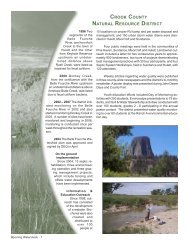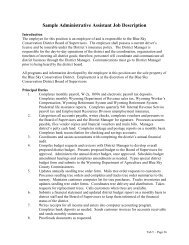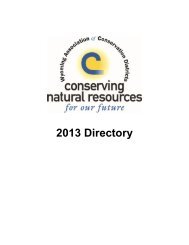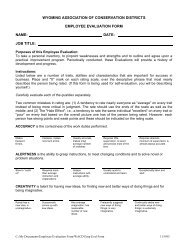LEGAL ASPECTS RELATING to DITCH RIGHTS and EASEMENTS
LEGAL ASPECTS RELATING to DITCH RIGHTS and EASEMENTS
LEGAL ASPECTS RELATING to DITCH RIGHTS and EASEMENTS
Create successful ePaper yourself
Turn your PDF publications into a flip-book with our unique Google optimized e-Paper software.
<strong>LEGAL</strong> <strong>ASPECTS</strong> <strong>RELATING</strong><strong>to</strong> <strong>DITCH</strong> <strong>RIGHTS</strong> <strong>and</strong> <strong>EASEMENTS</strong>STATE OF WYOMINGSTATE BOARD OF CONTROLREVISED 1994The law regarding ditch rights as a private property appurtenance separate from water rights is aconfusing <strong>and</strong> often misunders<strong>to</strong>od concept in Wyoming water administration. The vast majority ofwater users in Wyoming have the misunderst<strong>and</strong>ing that disagreements over the use of a ditch inall cases can be settled by decree of the water commissioner. While this may appear true undercertain conditions (W.S. 41-6-301 through 41-6-308), the more common problems brought <strong>to</strong> thewater commissioner are not settleable within his jurisdiction <strong>and</strong> the most he can do is offer advicebased on his knowledge of previous court decisions, always emphasizing that if his advice is notacceptable <strong>to</strong> all parties, those aggrieved should seek relief in civil court.The Wyoming Supreme Court in 1912 noted the separation between water rights <strong>and</strong> ditch rights inthe Collett vs Morgan case when it said:“The Board of Control had no power or authority <strong>to</strong> determine as between the parties, theownership or right <strong>to</strong> the use of the ditch. Its duties are confined <strong>to</strong> the distribution of thewaters of the state between the several appropria<strong>to</strong>rs, the granting of permits <strong>to</strong> use thewaters of the state for beneficial uses, <strong>to</strong> grant certificates therefore, <strong>and</strong> the generalsupervision of such waters…. The ditch ownership question cannot be settled by theBoard, but must be settled by agreement between the parties or by proceedings in court.”Keeping this in mind <strong>and</strong> observing the fact that ditch easement <strong>and</strong> ownership questions continue<strong>to</strong> come before the water commissioners, who are perceived by the public <strong>to</strong> be the logicallyempowered public servants from whom free ditch advice can be attained, the following are some ofthe most commonly asked questions <strong>and</strong> responses which most properly address the problems.1
Answer:Wyoming Statute 41-5-101 clearly states that:“The owner or owners of any ditch for irrigation, or other purposes, shallcarefully maintain the embankments thereof so that the water of such ditchmay not flood or damage the premises of others.”In addition <strong>to</strong> this statu<strong>to</strong>ry direction, the Wyoming Supreme Court, in the 1905case of Howell vs Big Horn Basin Colonization Company observed that:“The well settled rule is that the owner of an irrigating ditch is bound <strong>to</strong> exercisereasonable care <strong>and</strong> skill <strong>to</strong> prevent injury <strong>to</strong> other persons from such ditch,<strong>and</strong> he will be liable for such damages occurring <strong>to</strong> others as a result of hisnegligence or unskillfulness in constructing, maintaining or operating the ditch.”It is generally agreed that the “owner” or “owners” of a ditch consist of anyonewho uses the ditch or water therefrom for any purpose whatever. Theproportionate ownership of the ditch among several owners is determined by the“ratio between the water right of each water user <strong>to</strong> the <strong>to</strong>tal water rightsadjudicated under such irrigation works” (Wyoming Statute 41-6-303).9. Question: If my neighbor fails <strong>to</strong> properly maintain his ditch across my property, canI ask the water commissioner, State Engineer’s Office or Board of Control<strong>to</strong> institute damage or liability proceedings against him?Answer:No. Since a ditch is, in essence, an object of private property, anyone who feelshis private property rights have been violated must institute his own damageproceedings in a court of civil law. However, the water commissioner, uponinspection of an “undermaintained” ditch which cannot h<strong>and</strong>le its properlyadjudicated amount of water, may restrict the headgate of the ditch <strong>to</strong> where i<strong>to</strong>nly diverts what the ditch can safely carry. If one of the l<strong>and</strong>owners’ cropssuffers because of this restriction, he will probably have no recourse due <strong>to</strong> hisown failure <strong>to</strong> provide adequate capacity by proper maintenance.10. Question: What if I clean my ditch through a neighboring property, <strong>and</strong> then myneighbor runs his lives<strong>to</strong>ck in that same field or pasture, <strong>and</strong> thoselives<strong>to</strong>ck break down the banks of my ditch <strong>and</strong> generally put it in acondition of disrepair. Am I obligated <strong>to</strong> continue spending time <strong>and</strong>maintenance efforts on the ditch so that my water doesn’t damage hisproperty even though the disrepair is caused or accelerated by hislives<strong>to</strong>ck?Answer:Technically, Wyoming Statute 41-5-101 (cited above in Answer #8) is the onlyguidance which speaks <strong>to</strong> maintenance obligations. However, it is generallyagreed that in an instance of this type, reasonable maintenance is all that isrequired. It is also generally agreed that one who causes his own problems, isnot entitled <strong>to</strong> relief from another party. The Wyoming Supreme Court, in the1976 Bard Ranch vs Weber case, has said:“The owner of an easement <strong>and</strong> the owner of the l<strong>and</strong> encumbered by theeasement each possess rights, <strong>and</strong> each must, as far as possible, respect theother’s use.”4
11. Question: It is clear that my neighbor has the right <strong>to</strong> enter my property <strong>to</strong> maintainhis ditch. What will happen if I try <strong>to</strong> s<strong>to</strong>p him?Answer:The Wyoming At<strong>to</strong>rney General addressed this question in 1965 in quoting fromWeil in “Water Rights in the Western States” when he said:“As in the case of any easement, the ditch owner as the dominant, has the dutyof keeping the ditch in repair, <strong>and</strong> not the l<strong>and</strong>owner. Correspondingly, he hasthe right of entry upon the servient estate <strong>to</strong> make repairs <strong>and</strong> <strong>to</strong> clean out theditches, <strong>and</strong> if the l<strong>and</strong>owner interferes, injunction lies.”However, it is often the case that a l<strong>and</strong>owner who wishes <strong>to</strong> be in <strong>to</strong>tal controlof his own property will persuade the ditch owner <strong>to</strong> allow him <strong>to</strong> maintain theditch across his own property for the ditch owner. As long as he maintains it in acondition adequate for the passage of the proper amount of water, <strong>and</strong> in acondition acceptable <strong>to</strong> the ditch owner, there may be no reason for the ditchowner <strong>to</strong> enter the easement, although the right <strong>to</strong> do so continues <strong>to</strong> exist. If aconflict arises as <strong>to</strong> the adequacy of such maintenance, the matter may requirelitigation in the courts. Again, the water commissioner, State Engineer’s Office orBoard of Control, are not empowered <strong>to</strong> pass judgment on such a conflict.12. Question: Suppose a neighbor’s ditch crossing my l<strong>and</strong> is in a location which iscumbersome or a hindrance <strong>to</strong> the efficiency of my operation. Can Idestroy the ditch?Answer:No. Sutherl<strong>and</strong> on Damages (4th ed. Vol. 4, pg. 3760) says:“One who destroys a private irrigating ditch is liable for the difference in thevalue of the l<strong>and</strong> belonging <strong>to</strong> the owner without the ditch <strong>and</strong> with it.”13. Question: Suppose a neighbor’s ditch crossing my l<strong>and</strong> is in a location which iscumbersome or a hindrance <strong>to</strong> the efficiency of my operation. Can I requirehim <strong>to</strong> move the ditch or <strong>to</strong> put it in a buried pipeline in a location thatallows me the full enjoyment of my property?Answer:There is no statu<strong>to</strong>ry support for such forced requirement. In most cases, sincesuch a change may be a benefit <strong>to</strong> both parties, both may agree <strong>to</strong> a sharedproject which may create advantages for each of them. However, if the ditchowner feels there will be no advantage <strong>to</strong> him, he may refuse <strong>to</strong> enter such anagreement, particularly if the ditch has his<strong>to</strong>rically been <strong>and</strong> continues <strong>to</strong> beadequate for his purposes <strong>and</strong> is well maintained. In that case, the l<strong>and</strong>ownerwhose property is encumbered by the ditch may seek permission from the ditchowner <strong>to</strong> make the changes himself <strong>and</strong> at his own expense. If the ditch owneragrees <strong>to</strong> allow such a change, he is entitled <strong>to</strong> expect that his his<strong>to</strong>ric amount ofwater <strong>and</strong> patterns of use are not affected in any way. If the change is carriedout <strong>and</strong> the ditch owner’s use is affected, the l<strong>and</strong>owner responsible for makingthe change is obligated <strong>to</strong> correct whatever problems he may have created. Hemay also have <strong>to</strong> accept responsibility for any additional long-term maintenanceabove what was originally required before the work was done.5
14. Question: Suppose my ditch crossing a neighbor’s l<strong>and</strong> has his<strong>to</strong>rically caused aseeped or boggy spot in his property. Am I required <strong>to</strong> repair the ditch <strong>to</strong>s<strong>to</strong>p the seepage if he so dem<strong>and</strong>s?Answer:Technically, yes (see Question #8). However, numerous fac<strong>to</strong>rs enter in<strong>to</strong> aquestion of ditch seepage. If the problem has existed for many years <strong>and</strong> notgotten any worse, there may be a defense. If the complaining l<strong>and</strong>owner boughtthe l<strong>and</strong> with knowledge that the boggy area was present <strong>and</strong> it had existed prior<strong>to</strong> his acquisition of the l<strong>and</strong>, he may not be granted relief. In any case, thisagain is a matter <strong>to</strong> be litigated in civil court if the l<strong>and</strong>owners cannot reachagreement. A competent court would be the only entity able <strong>to</strong> evaluate theopposing claims in terms of property damage, etc.15. Question: Suppose I am the owner of a his<strong>to</strong>ric ditch crossing another owner’sproperty <strong>and</strong> he builds a new house or other structure in the vicinity of theditch which creates <strong>and</strong>/or is later damaged by seepage from my ditch. AmI liable for damages?Answer:Probably not. Wyoming Statute 17-12-103 provides for a “priority of right bylocation” which essentially says that if the ditch was there first, the owners of anyproperty introduced at a later time are compelled <strong>to</strong> protect themselves from anydamages caused by the ditch. On the other h<strong>and</strong>, the same statute requires thatif structures or other property were there before the ditch was built, the ditchowner is obligated <strong>to</strong> care for the ditch in such a manner as will prevent damage<strong>to</strong> any property located prior <strong>to</strong> ditch construction. If he fails <strong>to</strong> do so, he may befound liable for damages through civil proceedings.16. Question: If I own irrigated l<strong>and</strong> within the boundaries of an irrigation district orcompany, <strong>and</strong> a neighbor all of a sudden begins using a delivery lateral orwaste ditch in which I have always been the only user, can I have the watercommissioner, State Engineer’s Office or Board of Control throw him ou<strong>to</strong>f “my” ditch?Answer:No. Since there is no requirement that a permit map accompanying a filing <strong>to</strong> theState Engineer for a multi-owner ditch or canal has <strong>to</strong> show individual laterals fordelivery of water <strong>to</strong> each individual farm or tract, there is seldom any record forwater administra<strong>to</strong>r use delineating who all is entitled <strong>to</strong> use a specific deliverylateral or waste ditch. In the absence of any documentation <strong>to</strong> the effect of whohas a right <strong>to</strong> take water out of any given ditch, the only way <strong>to</strong> establishownership is, again, by agreement of the parties or through litigation. Itsometimes happens that the district or company will have its own map <strong>and</strong>/orlisting of users entitled <strong>to</strong> take water from a certain headgate or lateral <strong>and</strong> inthose cases, the findings of the direc<strong>to</strong>rs would rule. Since state wateradministra<strong>to</strong>rs normally have no records <strong>to</strong> determine such matters, they haveno authority deciding who can <strong>and</strong> can’t use a certain internal lateral or wasteditch.17. Question: Has there been any pronouncement as <strong>to</strong> legalities of someone placingunauthorized obstructions or undersized culverts in an irrigation orwastewater ditch?6
Answer:Aside from the knowledge that basic common sense dictates that one just can’<strong>to</strong>bstruct a ditch or channel where water is accus<strong>to</strong>med <strong>to</strong> flowing, WyomingStatutes regarding miscellaneous offenses <strong>to</strong> public health <strong>and</strong> safety providethe following penalty:“If any person, company, or corporation shall obstruct or injure…or shall inanywise pollute or obstruct any watercourse, lake, pond, marsh… or continuesuch obstruction…so as <strong>to</strong> render the same unwholesome oroffensive…[he/they] so offending…shall be fined not exceeding $100, <strong>and</strong>such nuisance…may be removed…by the sheriff of the proper county.” (W.S.35-10-401).Similarly, under the general regula<strong>to</strong>ry provisions of the Game <strong>and</strong> Fishstatutes, Section 23-3-204(b) (ii) reads:“No person shall allow any refuse or substance <strong>to</strong> pass in<strong>to</strong> any publicwater…which obstructs the natural flow, channels, or condition of any streamor body of water.”“Violation of this section constitutes a first degree misdemeanor.” (W.S. 23-3-204 (c)).Another direct reference in the statutes <strong>to</strong> ditch obstruction is found in thegeneral provisions regarding highways, <strong>and</strong> outlines the procedures <strong>to</strong> befollowed when such an obstruction causes flooding of public roads.“No person or persons…shall be permitted or allowed <strong>to</strong> dam the water orwaters of any stream or ditch…so that the water thus dammed…shall overflowany public road or highway…nor shall any person…owning or controlling anyditch or irrigated l<strong>and</strong>s, allow any wastewater from the same <strong>to</strong> flow across orupon any public road or highway. Any person finding a public road or highwayor bridge flooded or damaged by such wastewater may report the same <strong>to</strong> theroad supervisor of the county in which the road, highway, or bridge may belocated, who shall make an inspection <strong>and</strong> report <strong>to</strong> the prosecuting at<strong>to</strong>rneyof the said county. If the report <strong>to</strong> the…supervisor shows that such damagehas occurred, it shall then be the duty of the said prosecuting at<strong>to</strong>rney <strong>to</strong>institute proceedings against the party or parties whose negligence hascaused such damage.” (W.S. 24-1-116).While these references are somewhat specific as <strong>to</strong> their intent, it is again clearthat water administra<strong>to</strong>rs are not intended <strong>to</strong> be involved in their resolution.These statutes are not found under Title 41, the water statutes, but rather areconstructed under Title 23 (Game <strong>and</strong> Fish), Title 24 (Highway) <strong>and</strong> Title 35(Public Health <strong>and</strong> Safety), <strong>and</strong> require the complaining party <strong>to</strong> file a civilcomplaint with the proper civil authorities.The only possible reference <strong>to</strong> ditch obstruction in the Title 41 statutes wouldhave <strong>to</strong> be inferred from the “Prohibited acts” found under W.S. 41-5-110, whichwater administra<strong>to</strong>rs often refer <strong>to</strong> as the penalty reference for water stealing.That statute reads as follows:“Any person or persons who shall knowingly <strong>and</strong> willfully cut, dig or breakdown, or open any gate, bank, embankment or side of any ditch, canal orreservoir, flume, tunnel or feeder in which such person or persons may be joint7
owners, or on the property of another, or in the lawful possession of another orothers, <strong>and</strong> used for the purpose of irrigation, milling, manufacturing, mining ordomestic purposes, with intent maliciously <strong>to</strong> injure any person, association orcorporation, or for his or her own gain, unlawfully, with the intention of stealing,taking or causing <strong>to</strong> run or pour out of such canal or reservoir, feeder or flume,any water for his or her own profit, benefit or advantage, <strong>to</strong> the injury of anyother person, persons, association or corporation lawfully in the use of suchwater, or of such ditch, canal, tunnel, feeder or flume, he, she, it or they, sooffending shall be deemed guilty of a misdemeanor, <strong>and</strong> on conviction thereofshall be fined in any sum not exceeding one hundred dollars ($100.00), <strong>and</strong>may be imprisoned in the county jail not exceeding six (6) months, or both, inthe discretion of the court.While ditch obstruction is not specifically mentioned in this statute as an action aperson may carry out “with intent maliciously <strong>to</strong> injure any person…or for his orher own gain,” there exists a possibility that an offender attempting <strong>to</strong> stealsomeone else’s water by diverting it out of its proper ditch may place a dam orother obstruction in the ditch <strong>to</strong> facilitate such diversion. It appears that this isthe only circumstance in which a water administra<strong>to</strong>r would have jurisdiction <strong>to</strong>become involved, <strong>and</strong> even then, the duties would only extend <strong>to</strong> denying thes<strong>to</strong>len water or, under extreme circumstances, arrest for the act of stealingwater. The obliteration of a ditch or obstruction of a dry ditch in anticipation ofstealing water later would still be considered civil differences between parties,<strong>and</strong> be countered by the filing of a complaint with civil authorities.It sometime happens that someone will install a culvert crossing or other pipe,which is deemed <strong>to</strong>o small by the owner or owners of the ditch in a ditch used <strong>to</strong>supply appropriated water or carry wastewater. The water administra<strong>to</strong>r is oftencontacted <strong>and</strong> asked <strong>to</strong> require the offender(s) <strong>to</strong> either remove or install alarger pipe <strong>to</strong> res<strong>to</strong>re the original capacity of the ditch at that point. Becausethere is no statu<strong>to</strong>ry or case law guidance for the water administra<strong>to</strong>r <strong>to</strong> takesuch action, it is again proper <strong>to</strong> identify such a disagreement as a civil matterbetween the parties. While most water administra<strong>to</strong>rs have some degree ofengineering expertise, they are not, for the most part, qualified <strong>to</strong> determinewhether or not a pipe or culvert is of adequate or proper size <strong>to</strong> deliver or carrya specified amount of water. If the ditch overflows because the newly installedculvert can’t h<strong>and</strong>le the water, it will be necessary <strong>to</strong> determine whether it wasbecause the culvert was <strong>to</strong>o small, or whether the ditch owner was attempting <strong>to</strong>carry more water than he should have been. Such a determination would have<strong>to</strong> be made by a competent engineer retained by the parties, unless the wateradministra<strong>to</strong>r has extreme confidence in his engineering abilities, <strong>and</strong> is willing<strong>to</strong> st<strong>and</strong> behind them in court.18. Question: What if a l<strong>and</strong>owner builds a fence right up next <strong>to</strong> the ditch or across anyditch bank which has been clearly established as being within the his<strong>to</strong>ricmaintenance easement of that ditch?Answer:The answer <strong>to</strong> this question is the same as the answer <strong>to</strong> Question #11. If al<strong>and</strong>owner interferes with a ditch owner’s ability <strong>to</strong> maintain his ditch, the ditchowner may seek an injunction from the court ordering the l<strong>and</strong>owner <strong>to</strong> refrainfrom interfering.8
19. Question: Suppose a ditch owner or company, after cleaning its ditch through myproperty, leaves the silt or other dredged material in unsightly piles ordeposits it on my fence, road or other property. Am I obligated <strong>to</strong> acceptsuch treatment?Answer:Not necessarily. As discussed in the answer <strong>to</strong> Question #7, the ditcheasement cannot be continuously exp<strong>and</strong>ed or exercised without considerationfor the servient l<strong>and</strong>owner. The ideal method of disposing of dredged materialwould often be <strong>to</strong> load it in<strong>to</strong> dump trucks <strong>and</strong> haul it away. However,economics often dictate that this approach may not be feasible or desirable, orthat the material is needed <strong>to</strong> rebuild the banks of the ditch in the same area. Inthese cases, the ditch owner should take care in depositing the dredgedmaterial so as not <strong>to</strong> cover any more property than has his<strong>to</strong>rically beencovered <strong>and</strong>, upon completion of the cleaning, smooth the piles out in<strong>to</strong> a level<strong>and</strong> sightly berm if requested by the l<strong>and</strong>owner. As described in the answer <strong>to</strong>Question #7, any injury done <strong>to</strong> the l<strong>and</strong>owner raises the possibility of liabilityagainst the ditch owner.20. Question: Who determines the necessity <strong>and</strong> extent of ditch maintenance? Supposemy neighbor, with whom I share ownership of a ditch, decides that ourditch needs extensive work <strong>and</strong>, without talking <strong>to</strong> me, hires a contrac<strong>to</strong>r,or himself carries out work which I feel is far in excess of what wasnecessary <strong>to</strong> maintain the ditch in operating condition <strong>and</strong> then sends mea bill for my share. Am I obligated under W.S. 41-5-102 <strong>to</strong> pay myproportionate share of the cost of the job if I feel sure the work couldhave been done for much less cost?Answer:A co-owner in a ditch should never undertake <strong>to</strong> work on the co-owned ditchwithout discussing the necessity <strong>and</strong> extent of the proposed work with his coowners<strong>and</strong> securing their agreement as <strong>to</strong> what work needs <strong>to</strong> be done <strong>and</strong>how it will be paid for. The statute that obligates a co-owner <strong>to</strong> pay “…his, heror their proportionate share of the work…” uses the phrase “…necessary for theproper maintenance <strong>and</strong> operation of such ditch…” as the guide. Work doneover <strong>and</strong> above what is “necessary,” is done at the expense of the one whodoes, or contracts, the excess work <strong>and</strong> costs. Clearly, the only ones who c<strong>and</strong>etermine the necessity of maintenance work are the co-owners of the facility.In some cases, depending on his knowledge of the system, the local watercommissioner may be asked <strong>to</strong> give his opinion as <strong>to</strong> the necessity <strong>and</strong> exten<strong>to</strong>f work needed, based on the ditch capacity necessary <strong>to</strong> carry water <strong>to</strong> waterrights on down the ditch, etc. If the work has already been done at the time thewater administra<strong>to</strong>r is contacted, unless he has personal knowledge of thecondition of the ditch before the work, he should once again inform thecomplainants that their lawyers should be contacted <strong>to</strong> settle the matter. In thecase of a company ditch, it sometimes happens that the company as a wholewill vote <strong>to</strong> conduct maintenance or improvements on the ditch over theobjection of one or more of its members, who, once the work is done, willrefuse <strong>to</strong> pay for their proportionate share. Provided the benefits are deemed <strong>to</strong>be a value <strong>to</strong> the purpose of the whole company, it will generally be found thatthe enforcement provisions of W.S. 41-5-102, 103 <strong>and</strong> 105 are applicable.9
21. Question: Does my ditch maintenance easement through neighboring propertiesinclude the right <strong>to</strong> cut down trees that have grown up along the ditchbanks?Answer:His<strong>to</strong>rically in Wyoming the underst<strong>and</strong>ing has been that the ditch owner hasthe right <strong>to</strong> cut all trees <strong>and</strong> brush along the ditch as part of his obligation <strong>to</strong>“maintain the embankments thereof so that the water of such ditch may notflood or damage the premises of other” (W.S. 41-5-101). Mature tree rootsseeking water which grow out in<strong>to</strong> the line of a ditch have the effect of catchingtrash <strong>and</strong> debris which can plug the ditch <strong>and</strong> cause it <strong>to</strong> overflow, creating adamage liability for the ditch owner. St<strong>and</strong>s of trees along any watercourseoften attract beaver which create obstruction problems by cutting trees so thatthey fall in<strong>to</strong> the water with the same result. Tree root pathways in ditch banks,the same as in reservoir dams, create conduits for seepage which can result inwashouts <strong>and</strong> other injurious situations. Additionally, USDA SCS informationshows that one mature cot<strong>to</strong>nwood or willow tree will consume up <strong>to</strong> 250gallons of water per day, revealing that the cumulative consumption effects ofditch bank phrea<strong>to</strong>phytes can be negatively significant on appropriated waterwhich is being conveyed through a ditch on its way <strong>to</strong> its designated l<strong>and</strong>.With the proliferation of subdivisions in irrigated l<strong>and</strong>, the problem has taken onan additional dimension. Subdivision lot buyers who find an irrigation ditchtraversing their property often see a l<strong>and</strong>scaping opportunity in that the ditchprovides sort of an au<strong>to</strong>matic watering system. They will then plant expensivetrees or shrubs in the ditch easement with the intent that the roots from theirplants will grow directly <strong>to</strong> the ditch for water. When the ditch owner comesthrough <strong>to</strong> clean the ditch in the spring, his dual-tired trac<strong>to</strong>r mashes, breaks ordestroys the l<strong>and</strong>scape trees <strong>and</strong> the fight is on. To date in Wyoming there hasnot been found a successful civil case wherein the tree owners have overcomethe right <strong>and</strong> obligation of the ditch owner <strong>to</strong> maintain his ditch embankmentsunder W.S. 41-5-101. While under certain circumstances the l<strong>and</strong>owner <strong>and</strong>ditch owner might sign some sort of written agreement that the trees can stayas long as the l<strong>and</strong>owner will accept a transfer of liability <strong>to</strong> himself in case aninjurious situation occurs, any vegetation encroachment on the easement whichnegates the ability of the ditch owner <strong>to</strong> get his ditch cleaning equipmentthrough as he his<strong>to</strong>rically has should be rejected.22. Question: Suppose a spring flood or beaver work has changed the stream channelon my neighbor’s l<strong>and</strong> so that water <strong>to</strong> satisfy my appropriation no longercomes <strong>to</strong> my headgate. Can I enter my neighbor’s l<strong>and</strong> <strong>to</strong> res<strong>to</strong>re thechannel <strong>to</strong> protect my ability <strong>to</strong> divert?Answer:The Wyoming Supreme Court <strong>and</strong> Wyoming At<strong>to</strong>rney General have answeredthis question in the affirmative (see At<strong>to</strong>rneys General Opinions, July 27, 1965,Opinion 34). In the 1903 case of Willey vs Decker, the Wyoming SupremeCourt noted:“That a valid appropriation of water from a natural stream constitutes aneasement in the stream, <strong>and</strong> that such easement is an incorporealhereditament, the appropriation being in perpetuity, cannot be disputed. He isan appropria<strong>to</strong>r from the natural stream, through the intermediate agency ofthe ditch, <strong>and</strong> has the right <strong>to</strong> have the quantity of water so appropriated flow10
in the natural stream <strong>and</strong> through the ditch for his use.”The Wyoming At<strong>to</strong>rney General elaborated on this language by quoting Kinneyon Irrigation <strong>and</strong> Water Rights:“Where a person has acquired the right <strong>to</strong> a certain amount of water in astream by the appropriation of the same, he also acquires the right <strong>to</strong> havethat water flow in the natural stream <strong>and</strong> over the l<strong>and</strong>s of others down <strong>to</strong> thehead of his ditch. The appropriation of the water also carries with it an impliedauthority <strong>to</strong> do all that may become necessary <strong>to</strong> secure the benefit of theappropriation. He therefore has the right <strong>to</strong> enter the bed of the stream abovethe head of his ditch, even on the l<strong>and</strong>s of others, <strong>and</strong> <strong>to</strong> remove sediment orobstructions which may have changed or obstructed the course of the currentso as <strong>to</strong> prevent it from flowing down <strong>to</strong> <strong>and</strong> entering his ditch. Thus <strong>to</strong> thisextent the appropria<strong>to</strong>r acquires an easement in the l<strong>and</strong>s through which thestream flows; but the right thus acquired is one which must be held <strong>to</strong> thenarrowest limits compatible with the principal right, which is the use of thewater. No unnecessary injury must be done <strong>to</strong> the l<strong>and</strong>s of another in makingthe change, or the person making it will be liable in damages.In summary, it is emphasized that this memor<strong>and</strong>um is not intended <strong>to</strong> provide conclusive legalanswers <strong>to</strong> the questions posed. It is also emphasized that water administra<strong>to</strong>rs are notempowered <strong>to</strong> adjudge as between parties involved in ditch disputes. This memor<strong>and</strong>um isintended <strong>to</strong> provide the water administra<strong>to</strong>r with a general background of his<strong>to</strong>ric practice thecourts have used <strong>to</strong> resolve conflicts over the use of ditches, in order that the administra<strong>to</strong>rmay have documented references <strong>to</strong> support any advice he may be called upon <strong>to</strong> offer <strong>to</strong>persons involved in conflicts over ditch matters. It is also intended <strong>to</strong> provide wateradministra<strong>to</strong>rs with the ability <strong>to</strong> be consistent with their counterparts across the state in thepositions they may take when confronted with the situations noted. It is possible in some casesthat litigation may be avoided by the water administra<strong>to</strong>r’s ability <strong>to</strong> offer advice as adisinterested or neutral arbitra<strong>to</strong>r, but he should not represent his advice as being a finaldecree. Upon receipt of the administra<strong>to</strong>r’s advice, the parties must be allowed <strong>to</strong> make theirown decision as <strong>to</strong> whether or not they wish <strong>to</strong> seek additional legal advice or pursue litigation.11



